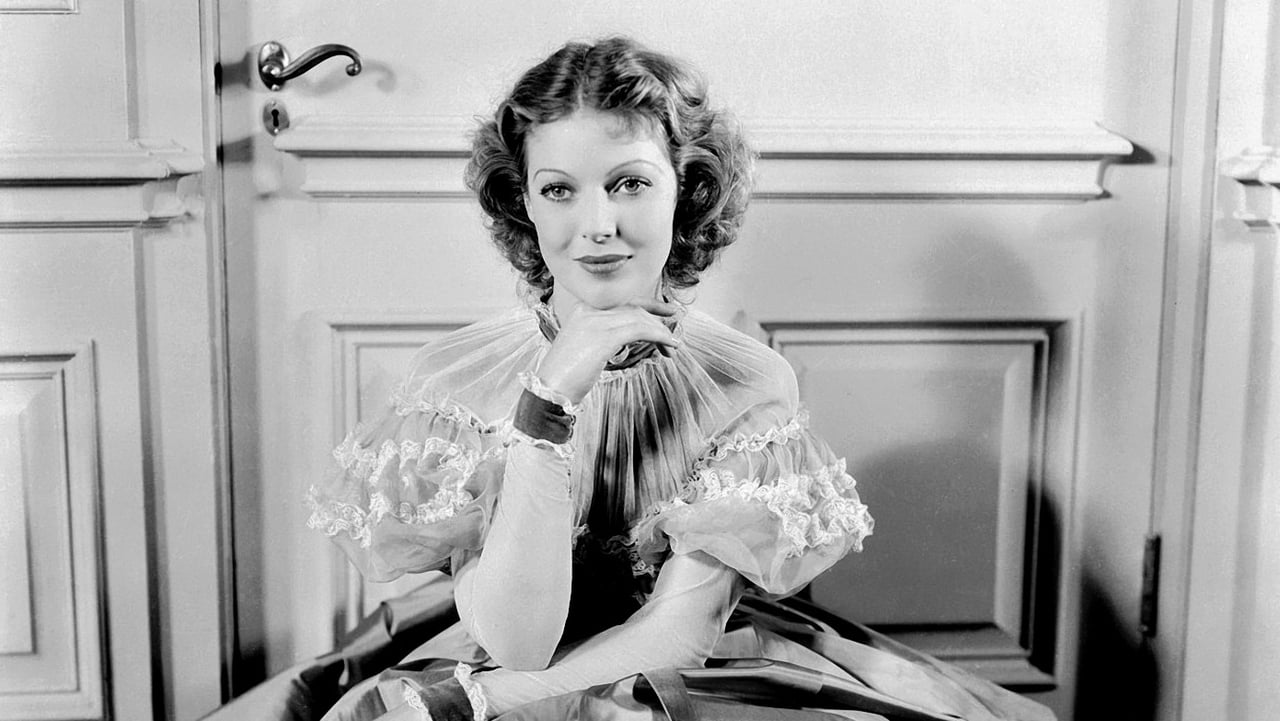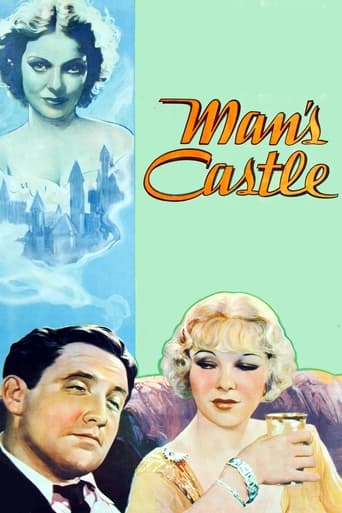

This is a must-see and one of the best documentaries - and films - of this year.
... View MoreGreat story, amazing characters, superb action, enthralling cinematography. Yes, this is something I am glad I spent money on.
... View MoreThis movie tries so hard to be funny, yet it falls flat every time. Just another example of recycled ideas repackaged with women in an attempt to appeal to a certain audience.
... View MoreI enjoyed watching this film and would recommend other to give it a try , (as I am) but this movie, although enjoyable to watch due to the better than average acting fails to add anything new to its storyline that is all too familiar to these types of movies.
... View MoreMy parents lived through the depression, and they would have found themselves right at home in the world of Man's Castle. Bill's roughness is entirely appropriate for the times, given that he must live by his wits in a difficult world. Trina's sweetness seems a bit unreal, given the cynicism of our times, but I believed in it because Loretta Young gives a very natural and moving performance. She was only 20 and acts like a much more experienced performer.The romanticism of the movie is wonderful to see. Borzage--whose work I'd never seen before--believes in what he's doing and makes us believe in it too. Roosevelt is fresh in the White House and there is a spirit of hope and renewal in the country. I could criticize the editing for being a little too abrupt (cutting the film down to fit the B part of a double-bill), as an example the scene with Bill and Fay in her rooms, but that doesn't detract from my admiration.
... View MoreI saw this film on TCM the other evening and I really liked it. I think I particularly enjoyed Loretta Young's character. Anyway, the acting is that pre-Method type of acting that was pretty much the standard in films before 1950. For modern, young audiences it might take a little adjustment. It's like riding in a classic car; you don't do it for the luxury or to get some place in a hurry, but just to enjoy it.It is a pre-code film so the two lead characters were seen actually living together, and pawing each other. Then, before the wedding of the two, the female character announces that she is pregnant. It presents Tracy's character with a dilemma; does he do what his gut wants him to do, or does he do what his heart wants him to do.Despite the old-fashion acting, I thought that Tracy and Young showed a lot of chemistry together. I actually became a bit mesmerized by the two's performances.
... View MoreThis is very dated, but that's part of the charm with this 1933 movie. You can say the same for most Pre-Code films; they're just different, and usually in an interesting way.It was the short running time, the great acting of Spencer Tracy and the beautiful face and sweetness of Loretta Young's character which kept me watching and enjoying this stagy-but-intriguing film.You'd be hard-pressed to find a nicer girl than "Trinna," played by the 20-year-old Young who was already into making her 50th movie! (She started acting as a small child. That, and the fact they made movies quickly back in the old days.) The camera, although in soft focus throughout much of the film, zoomed in on Loretta's face and eyes many times and I was mesmerized by her beauty.Playing a crotchety man with a cynical outlook on life, Tracy's "Bill" slowly transformed into a loving man, thanks to Trinna. Spencer delivered his lines here with such naturalness that you hardly knew he was acting.Although they have small roles, supporting actors Walter Connolly, Marjorie Rambeau, Arthur Hohl and Glenda Farrell leave lasting impressions long after viewing this 75-minute film. I was particularly fascinated with Connolly's role as the minister/father figure of the camp.The story is a little far-fetched but - hey - that's the movies. This story is about two lonely Great Depression victims trying to survive in a "Hooverville"-type camp and it winds up to be a very touching tale.
... View MoreMan's Castle (1933) *** (out of 4) A rather bizarre love story from Borzage set during the Depression-era as two different people are brought together through being poor. Spencer Tracy plays a hot tempered man who has the charm to live a good life but instead plays it day to day just making what he has to. He takes in a poor woman (Loretta Young) and they hit it off well even though he mistreats her and she might want something out of him that he'd never be able to give. If the term love story makes you want to pass this film up then you might want to think again because this isn't the tear jerker that would have women lining up buying tickets. Instead, this is a pretty mean spirited pre-code that has all sorts of stuff from premarital sex to abused women to suffering because of being poor and even a brief mention of an abortion. Did I mention that Tracy and Young go skinny dipping early in the movie? At the heart of the film is a love story but we've got so much other stuff going on that you might lose site of that. For starters, Tracy's character is one of the biggest S.O.B's you'll likely see in a film from this era. He's incredibly mean and often takes it out on Young who doesn't mind getting insulted or being left behind when he's out with other women. I think a lot of people are going to be turned off because of how mean he is but I guess this is a part of the "moral" in the film. Tracy delivers another fine performance and I think the reason I personally didn't hate his character more is because of how good the actor was. He certainly pulls off the meanness without any trouble but at the same time you can just look at him and know there's something under that toughness. Young, perhaps my favorite actress, also delivers another winning performance. She's very believable in the abused woman role even though you want to ask her why she's with the jerk. The film has a message about a lot of issues and this is another reason why it remains rather fresh today especially since we're going through another hard time with people without jobs and unable to eat. The speech Tracy's character gives to a restaurant early on is something that would probably get a standing ovation today.
... View More